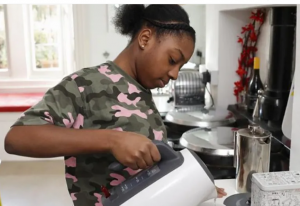Falling gas and electricity prices have driven UK inflation to its lowest level in almost three years.
Prices rose at 2.3% in the year to April, down from 3.2% the month before, official figures show.
While inflation, which measures the price of something over time, has fallen further, it remains higher than the Bank of England’s target of 2% and was slightly higher than experts expected.
But the Bank has hinted that interest rates, which have been raised in recent years to slow price rises, could be cut this summer. Rates are currently at 5.25% – the highest level in 16 years.
Lower gas and electricity prices were the main driver behind the sharp inflation drop last month as a lower price cap – which fixes the maximum price that can be charged for each unit of energy – kicked in.
Energy prices were 27% lower in April compared to 12 months before, with gas prices alone down 38%.
Easing tobacco and food price rises also contributed to the inflation fall, but costs for mobile phone bills and rents continued to rise.
Sarah Coles, head of personal finance at Hargreaves Lansdown said for the average household, energy prices were still relatively high.
“It’s still a huge increase on the levels we saw before the invasion of Ukraine – when the cheapest deals cost around half this amount – but it’s a real shot in the arm for anyone trying to make ends meet,” she added.
Some foods, such as milk, butter, poultry and fish were cheaper in April than they were a year earlier, due to falling fertiliser prices and tougher negotiations from supermarkets on own-brand items, Ms Coles explained.
But she said olive oil, cocoa and crisps were up because of disappointing harvests and high demand.
Prime Minister Rishi Sunak said the figures marked a “major moment for the economy, with inflation back to normal”.
“Brighter days are ahead, but only if we stick to the plan to improve economic security and opportunity for everyone,” he added.
But Labour’s shadow chancellor Rachel Reeves said now was “not the time for Conservative ministers to be popping champagne corks and taking a victory lap”.
Prices for all goods – ranging from food to household appliances – decreased marginally by 0.8% in April compared to this time last year.
But services inflation, which measures price rises for things such as haircuts or train tickets, remained elevated at 5.9%.
Soaring energy costs have been the main cause of the high cost of living in recent years, putting households and business under financial pressure.
Global as and oil prices soared following Russia’s invasion of Ukraine in February 2022. In the UK, the impact of the commodity price hikes saw inflation rise to 11% in October 2022 – its highest rate in 40 years.
Butcher Gary Wildman, owner of John Wildman & Sons in Rustington, West Sussex, told the BBC his business costs had gone up but the prices of his products had levelled off.
“Prices are probably 10 to 15% more than they were at the beginning of Covid but they are level now definitely,” he added.
“You can’t pass all the cost onto the customers otherwise the customers won’t come in but because the prices of stuff is a bit higher the profit stays pretty much the same.”
But it warned it wanted to see “more evidence” before deciding to cut rates, which means August or September appear to be the most likely timing for a first cut, if inflation continues to fall as expected.
The interest rate set by the Bank dictates the rates set by High Street banks and money lenders. Higher rates mean people pay more to borrow money for things such as mortgages and loans, but savers also receive better returns.
“It feels like this should be a healthy dose of good news, but anyone with a mortgage will be sickened to hear it’s not as good as it seems,” said Mr Coles.
Rob Wood, chief UK economist at research consultancy Pantheon Macroeconomics, added that an August interest rate cut “looks much more likely than a June reduction after services inflation shockingly barely fell in April”.
Danni Hewson, head of financial analysis at AJ Bell, agreed, adding that the “expectation of a June rate cut has been washed away like confetti after rain-soaked summer wedding”.
She said financial markets expectations of a rate cut next month had “plummeted from 50/50 to just over 10%”.
Tackling it Together branding
How to keep energy use, and bills, down during warm months
Sarah Osborn has shared three tips to keep on top of energy use during the warmer months:
If your hot water is too hot to wash your hands in, then your setting is too high so turn the boiler down
Manage your draughts, such as putting a black bag with scrunched up paper up an unused chimney, or limit other draughts around the home
Limit time in the shower to four minutes. The charity WaterAid has compiled a playlist of four-minute songs to keep you to time
Read more here if you are struggling to pay energy bills
BBC

